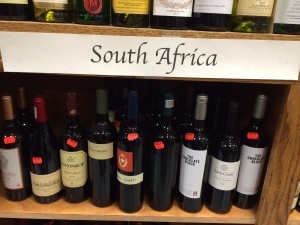Why South Africa Should Not Be Graduated From AGOA
With attention turned towards the renewal of the African Growth & Opportunity Act
(AGOA), some have called for South Africa to be graduated from the duty preference
program because of its well-developed infrastructure and labor force. Some have also
raised the issue of certain non-tariff barriers said to exist that prevent U.S. companies
from entering the South African market.

Recently, the U.S. International Trade Commission (USITC) held hearings and invited comments on
AGOA in relation to four investigations covering: (1) AGOA trade and investment performance; (2) the
economic effects of providing duty-free treatment to AGOA-eligible countries; (3) possible changes to
AGOA’s rules of origin to promote regional integration and to increase exports to the U.S.; and 4) the
impact of EU’s free trade agreement with South Africa on U.S. exports.
Many commented both in their oral testimony and in written comments on the importance of keeping
South Africa as part of AGOA. First, the argument has been made that it would seriously hamper
regional integration, critical to the establishment of value chains in Africa. To demonstrate the
importance of regional integration to the success of AGOA, the Honorable H. E. Girma Birru,
Ambassador of the Federal Democratic Republic of Ethiopia to the U.S. and Co-chair of the AGOA
Ambassadors Working Group, testified as follows regarding the negative impact of exclusion of another
country:
AGOA has a critical role in Africa’s integration efforts. Gradually, AGOA is adding momentum to
regional integration by, among other things, helping promote regional value chains. To give a specific
example, before Madagascar lost its eligibility, a typical example in the production of garment was that
cotton was sourced from Zambia, fabrics from Lesotho and Mauritius, zippers from Swaziland and
assembled in Madagascar. There is no question that similar types of cross-border value chains can be
developed for many AGOA export products if proper regional strategy is put in place.
The same analysis applies for South Africa.
Second, if South Africa were treated as a special case, it might create a slippery slope affecting the
other 12 non-LDC’s including Kenya, Namibia, Nigeria and Ghana. According to Ambassador Birru, the
introduction of graduation provisions in AGOA would work against “ongoing efforts to strengthen Africa’s
regional integration and boost intra-African trade.” He further stated that graduation at “this stage of the
US-Africa partnership would be punitive and may be counter-productive to economic growth and
regional integration in the SSA region.”
Third, according to Dr. Witney Schneidman, exclusion of South Africa would inflict a serious
economic injury on South Africa, one of the most important partners for the U.S. on the continent.
According to the Congressional Research Service, AGOA-qualifying imports from South Africa totaled
$3.7 billion in 2012. This constituted about three-quarters of all U.S.-AGOA imports from Sub-Saharan
Africa. About half of South African AGOA exports were vehicles or transportation equipment. The
automotive industry in South Africa is the fifth largest employer. Ending preferential treatment for South
Africa would hurt this large sector greatly. Thus, it would be a mistake to graduate South Africa.
While there has been widespread support for continued inclusion of South Africa in the program, the
cries for exclusion cannot be ignored in effecting a seamless renewal of AGOA with South Africa as part
of the program. The November 18, 2013 letter from various U.S. agricultural entities to Congressional
leaders identifying certain measures deemed to be foreign trade barriers by the USTR in its annual
report should be addressed, but outside the context of AGOA. Similarly, the concerns of the National
Chicken Council and the USA Poultry and Egg Export Council cannot be ignored. These groups claim
that they would prefer “to support renewal and extension of AGOA, and in particular its continued
application to South Africa.” However, they are demanding some action on the part of South Africa, or
they would have no choice but “to ask Members of Congress to vote ‘no’ on AGOA renewal.”
In sum, substantial reasons have been set forth why it would be harmful to graduate South Africa from
AGOA. If there are issues to be resolved with South Africa, the authorities are urging that they be
resolved outside of AGOA renewal. However, it is also clear that the political realities must be
addressed in order to avert a battle that might prevent seamless renewal.
